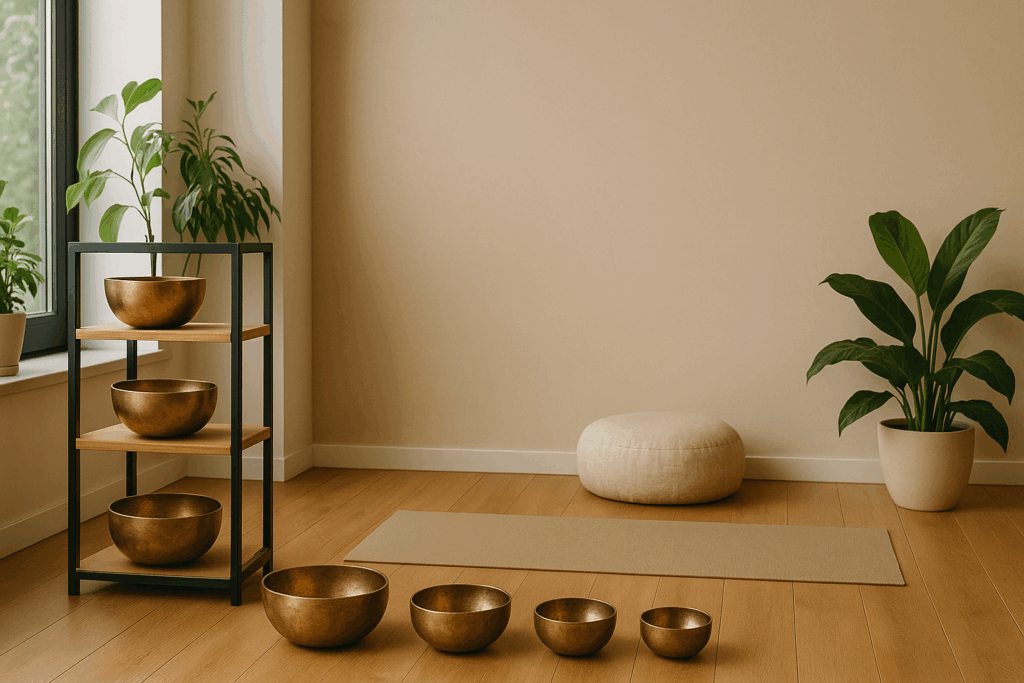7 Ways to Use a Singing Bowl for Space Decoration in Yoga and Meditation Studios
Table of Contents
Introduction: Why Atmosphere Matters in Spiritual Spaces
Creating a harmonious atmosphere is essential for yoga teachers and spiritual instructors. A well-designed space not only calms the mind but also enhances the overall energy of the practice environment. Among the many tools available for ambiance, singing bowls stand out for their unique dual purpose—they beautify a room while also contributing to its auditory landscape. As more studios turn to space decoration that promotes both stillness and inspiration, these handcrafted instruments are becoming staples in mindful interiors.
The Role of Singing Bowls in Harmonizing a Room
Unlike ordinary decorative pieces, a singing bowl radiates intention. Crafted from traditional metals or crystal, each bowl offers more than beauty—it channels sound frequencies that resonate with our body’s energy centers. Placing a bowl in a meditation studio not only enhances the aesthetic value but also brings a rhythmic vibrational quality that supports healing and focus. Their presence alone subtly aligns the space, encouraging a slower, more grounded energy.
Choosing the Right Singing Bowl for Your Studio Decor
Selecting a singing bowl for decorative purposes involves more than matching colors. Consider:
Material: Bronze, brass, or crystal?
Finish: Polished shine or aged patina?
Size: From 8cm handheld bowls to large 30cm centerpieces
For minimalist spaces, a small Tibetan bowl in a matte finish might suffice. For studios with earthy tones or Bohemian style, a large hand-engraved bowl with floral or mandala motifs can anchor the energy of the room. Dionysus Artcrafts, for example, offers customizable bowls with sacred symbols that blend spirituality and craftsmanship—a perfect match for yoga sanctuaries.
Visual Placement Ideas for Space Aesthetics
The key to successful space decoration is intentional placement. Here are some placement strategies:
At the entrance: Welcome energy flow with a bowl on a pedestal surrounded by crystals
Under windows: Use natural light to reflect off polished surfaces, drawing attention to their form
At the altar: Centerpiece for spiritual focus, surrounded by incense or affirmation cards
Wall-mounted ledges: Floating shelves for bowls, adding a modern touch without losing sacredness
Acoustic Impact: Enhancing Energy Through Sound
A major benefit of using singing bowls in interior design is their contribution to sound quality. Even without being played regularly, the presence of bowls shifts the sonic expectation of a room. Acoustic experts suggest that their curved surfaces help diffuse sound gently, adding warmth to otherwise cold environments. When placed near soft materials like cushions or rugs, they act as harmonic resonators that blend with guided meditations, chanting, or background music.
For teachers using music or vocal toning during sessions, strategically placed bowls near speakers or gongs can deepen the audience’s sensory experience. The visual symbolism combined with actual tone generation forms a holistic resonance.
Click here to see more customizable singing bowls.
Pairing Singing Bowls with Other Decor Elements
Great space decoration is about harmony, not clutter. Singing bowls integrate beautifully with:
Textiles: Silk scarves, woven mats, or chakra-themed tapestries
Natural Elements: Driftwood stands, bamboo backdrops, dried flowers
Lighting: Candlelight, salt lamps, or soft Edison bulbs
Functional Objects: Cushions, meditation benches, aroma diffusers
Think of your bowl as both centerpiece and supporting actor—it doesn’t dominate the space but elevates everything around it. Custom-engraved singing bowls with brand logos or symbols (offered by Dionysus Artcrafts) can also become a studio’s signature element.
Case Studies: Yoga Studios that Transformed with Singing Bowl Accents
Case 1: Flow & Root Studio – Seattle, WA
Flow & Root transformed a bare loft into a sound-based sanctuary by installing a singing bowl altar at the heart of their group meditation area. Attendance and feedback improved as clients commented on the “vibrational calm” felt upon entering.
Case 2: Inner Resonance Yoga – Austin, TX
This studio curated a chakra-themed layout, where each room featured bowls tuned to specific frequencies. Each space had corresponding colors, essential oils, and textures—creating a fully immersive journey.
Case 3: The Zen Den – San Diego, CA
Utilizing Dionysus’s bronze singing bowls with antique patina, The Zen Den complemented its coastal theme with shell decor, white linen curtains, and minimalist bamboo shelving. The bowls doubled as session starters and focal visual elements.
Maintenance and Care for Long-Term Display
Even in a decorative role, singing bowls require care to maintain their beauty and resonance:
Dust regularly with a soft cloth
Avoid direct sunlight to prevent fading of engraved patterns
Handle with clean hands to avoid oils altering the metal finish
Polish occasionally using natural, non-abrasive solutions
For crystal singing bowls, always store them with protective cushions or padded bags, especially if used occasionally for sound therapy.
Conclusion: Where Sound Meets Space Design
Incorporating a singing bowl into your studio’s space decoration does more than elevate its aesthetic—it turns the room into a living meditation. Each bowl radiates intention, invites attention, and transforms stillness into presence. As yoga and meditation continue evolving in the West, integrating handcrafted tools like these allows teachers and guides to reflect their values in the very walls of their practice.
A space that sings is a space remembered. Let your studio speak through form, sound, and sacred beauty.

